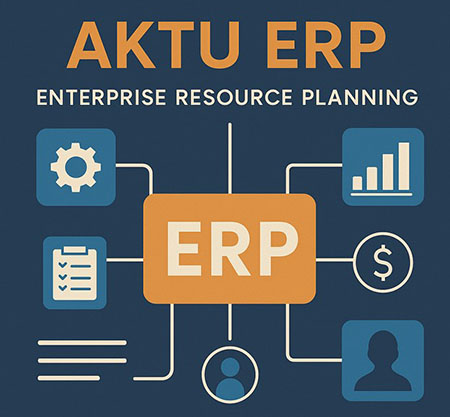AKTU ERP: Powering Digital Education at Scale
In a world where technology redefines every sector, education is no exception. From remote learning to AI-based assessments, digital transformation is revolutionizing how institutions function. At the heart of this movement within Dr. A.P.J. Abdul Kalam Technical University (AKTU) in Uttar Pradesh, India, lies a pivotal tool: the AKTU ERP (Enterprise Resource Planning) system.
This comprehensive platform is not just a technical framework—it’s the digital nervous system of AKTU. It connects students, faculty, administrators, and stakeholders under one cohesive umbrella, enabling transparency, efficiency, and growth. Let’s explore what makes AKTU ERP a cornerstone in the university’s operations and why it matters in the larger landscape of higher education management.

Understanding AKTU ERP: What Is It?
ERP systems are traditionally known in the corporate world, where they help companies manage operations such as HR, finance, inventory, and customer relationships. AKTU ERP adopts this enterprise-grade approach and adapts it for academia, streamlining processes like:
- Student registration and admissions
- Attendance and academic performance tracking
- Faculty profiles and teaching schedules
- Internal examinations and results
- Degree and marksheet generation
- AICTE and NBA compliance support
In essence, AKTU ERP digitizes the life cycle of a student—from admission to graduation—while simultaneously enabling administration to run data-driven operations.
A Centralized Approach to Academic Management
Before ERP implementation, AKTU and its affiliated colleges managed data using disparate systems, manual processes, and disconnected databases. The result? Delays, inconsistencies, errors, and inefficiency.
With the introduction of AKTU ERP, all departments and processes began communicating on a single platform. Here’s how that makes a difference:
- Real-Time Access to Academic Data
Students can view their academic records, attendance, internal assessment scores, and final grades at any time. No more waiting in line or dealing with lost files.
- Faculty Management
Faculty members can update lectures, mark attendance, assign internal grades, and evaluate students—all through the ERP dashboard. This reduces paperwork and increases teaching efficiency.
- Transparent Examination System
AKTU ERP provides real-time integration with the university’s examination wing. Results are calculated, reviewed, and published through the system, eliminating bottlenecks.
- Enhanced Communication
Notices, alerts, feedback, and scheduling updates are shared directly with stakeholders via their dashboards. No important updates are missed.
Modules that Make AKTU ERP Powerful
AKTU ERP’s success lies in its modular design. Each module is tailored to fulfill a specific need within the educational ecosystem. Some major modules include:
- Student Module: Registration, profiles, course enrollment, marks, backlogs, and grievances.
- Faculty Module: Time tables, syllabus, lecture plans, performance tracking, and feedback.
- Administration Module: College affiliation processes, fee submissions, course approvals, and exam management.
- Academic Monitoring Module: AI-based dashboards track college performance and compliance metrics.
- Alumni and Placement Module: Alumni interaction, resume building, and placement coordination.
This modularity enables scalability—new features can be added without disrupting the core system.
How AKTU ERP Benefits Stakeholders
ERP systems often face criticism for being overly technical or cumbersome. But AKTU ERP, through intuitive design and user training, addresses this concern.
For Students
- Personalized dashboards for academic insights
- Exam schedules and marks instantly accessible
- Simplified form submissions and documentation
- Status tracking for grievances and re-evaluation requests
For Faculty
- Easy uploading of marks and attendance
- Assignment and lecture tracking tools
- Integration with course outcome mapping
- Feedback and performance analytics
For College Admins
- Seamless exam planning and internal audit tools
- Affiliation renewal workflows
- Monitoring student-faculty ratio and infrastructure utilization
For the University
- Macro-level academic trend analysis
- Detection of performance anomalies in colleges
- Evidence-based governance for AICTE, NAAC, and NBA
Digital Governance in Action
One of AKTU ERP’s lesser-known but vital features is its alignment with government policies such as the Digital India initiative. By encouraging paperless workflows, instant verification of records, and decentralized data access, AKTU ERP reflects the spirit of digital governance.
Moreover, the platform supports various security measures such as:
- OTP-based authentication
- Role-based access control (RBAC)
- End-to-end data encryption
- Audit trails for every transaction
These features ensure that sensitive academic data remains secure and compliant with national data regulations.
Challenges and the Road Ahead
While AKTU ERP has made great strides, it’s not without its challenges:
- Load Management: During peak times (admissions, exam results), the system faces server strain.
- Training: Some students and faculty still struggle to adapt to its features fully.
- Data Integration: Many affiliated colleges use additional software, making ERP integration complex.
To overcome these challenges, AKTU plans to invest in:
- Cloud-based scalability
- Advanced user support systems (chatbots, ticketing)
- Integration with NEP (National Education Policy) 2020 frameworks
Lessons for Other Institutions
AKTU ERP serves as a benchmark for universities across India aiming to digitize their operations. Key takeaways include:
- Customization over Standardization: AKTU’s ERP isn’t a one-size-fits-all solution—it’s tailored to academic workflows.
- Stakeholder Training is Crucial: The best software is useless without proper training.
- Data is Power: With analytics and dashboards, the university can make data-driven decisions quickly.
- Security Cannot Be Ignored: Strong cyber hygiene is a must for education systems managing millions of records.
Conclusion: The Future Is Digital—and Personalized
AKTU ERP isn’t just software—it’s a strategic educational infrastructure. In a state as vast and diverse as Uttar Pradesh, managing hundreds of affiliated colleges is no easy feat. Yet, through automation, centralization, and real-time data access, AKTU ERP brings order to academic complexity.
As we enter an era of personalized learning, skill-based evaluation, and AI-enhanced education, platforms like AKTU ERP will continue to evolve. Their role? Not just to record and report—but to empower.
From admissions to alumni, AKTU ERP is building bridges between administration and aspiration, shaping India’s future one student at a time.